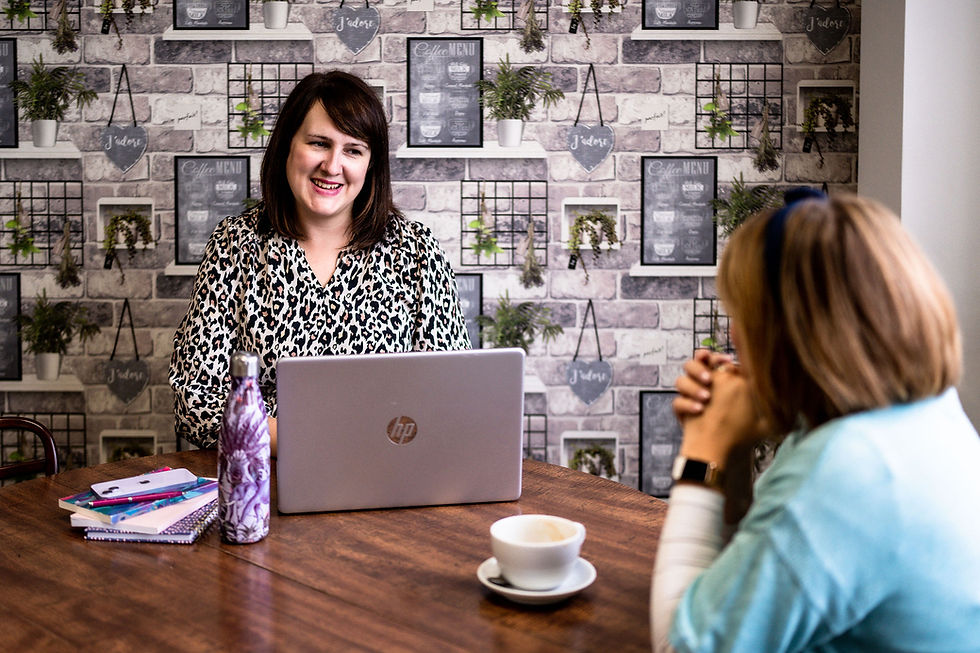5 mistakes brands make when writing for parents
- Nov 17, 2024
- 4 min read

Being a parent is the toughest job in the world, and from my experience, parents want relatable content and reassurance that they’re child is ok and that they’re doing a good job as a parent.
As a mum, I find it really frustrating when I read content that’s patronising or authoritarian. A lot of brands just want to push their sales message and forget to think about what’s in it for the reader and why they should care.
During my millions of years as a writer, I’ve learnt that it’s not about the kind of content you want to write, it’s about the audience and what they want to read.
So here are some examples I’ve come across in the real world, from well-known parenting brands, which I’ve then adapted to make them more engaging and friendly for parenting audiences.
Example 1: Too cold and information driven
Sleep is a vital biological function controlled by both the circadian rhythm and sleep pressure; understanding this can help you lay a strong foundation to support and enhance sleep.
I can feel my eyes glazing over with all the science talk. Vital biological function? Circadian rhythm? I’ve already switched off.
The word ‘controlled’ also has negative connotations to me in this context. I also don’t tend to associate sleep with pressure. Plus ‘strong foundations’ feels more at home in a building magazine.
I reworked this to be a little warmer and less scientific, while still providing useful information. It’s now more reassuring and relatable.
My version: Although they might fight it, sleep is super-important for your little one, and it’s guided by two key factors: their natural body clock and the build-up of tiredness. Knowing this can help you create a solid sleep routine that works wonders - not just for them but for you too! Because, let’s face it, a good night's sleep is something the whole family deserves.
Example 2: Formal and authoritarian
Monitor whether you are drinking enough; if your trips to the toilet are frequent and the colour of your urine is pale and without smell, you are on track.
This feels quite formal. The use of contractions like ‘you’re’ would make it more friendly. Any why say ‘frequent’ when you can just say ‘often’? Plus, the word ‘monitor’ doesn’t fit quite right here, and ‘urine’ sounds too clinical.
I’ve reworked this to sound more friendly and less like you’re talking to your doctor.
My version: Keep an eye on how much you’re drinking throughout the day. If you’re heading to the loo often and the colour of your wee is pale with little to no smell, you’re doing great!
Example 3: Dictatorial and opinionated
When designing your baby’s nursery, you’ll want to create a space that is relaxing and tranquil, so you’ll need to think about your colour palette - I personally find calming pastels work great in nurseries.
The language here sounds very dictatorial and authoritarian. For example, ‘you’ll want to’ and ‘you’ll need to’ sounds like they’re telling the reader what to do. The use of ‘tranquil’ sounds too stuffy.
I’ve reworked this to sound less authoritarian. It makes suggestions but doesn’t say you must do this or you need to do that. Peaceful snuggles and hopefully restful nights gives a warm and reassuring feeling.
My version: When you’re setting up your baby’s nursery, think about the colours you want to use. I’m a big fan of calming pastels as they do wonders to create a cosy, calming vibe that’s perfect for peaceful snuggles and (hopefully!) restful nights.
Example 4: Assuming and condescending
If you delay potty training until the summer months, you may find your little one will show no interest, which will make potty training a lot more difficult for you and your little one.
This sounds quite speculatory. All babies are different and respond in different ways. There’s no black and white with potty training, but this makes it sound definite. The use of ‘if you delay’ also sounds quite threatening.
My rework is quite a bit longer, but I think it’s important to explain the benefits of not waiting, which is what I think the original piece was trying to do. Again, I’ve used relatable and reassuring language - like ‘don’t have to worry’ and ‘we all know’.
My version: Waiting until summer to start potty training might seem like a good idea, because your little one can roam the garden and you don’t have to worry about carpet accidents! But we all know how quickly kids' interests can change, and they might be less curious about potty training by summer, which could make things trickier. Starting when they’re ready (even if it’s not ideal weather) can make the whole process smoother and more relaxed for both of you!
Example 5: No use of relatable examples
Baby gates are not just for stairs; they are great for keeping your baby out of − or in − certain areas, while still keeping the door open.
The language here is quite formal as they’ve not used contractions. They’ve used the word ‘keeping’ twice in the same sentence, which is repetitive but also sounds quite restrictive.
Again, my version goes a bit deeper into an explanation, using realistic examples of how stair gates can help parents.
My version: Baby gates aren’t just for the stairs - they can be a lifesaver in the kitchen too! For example, popping a gate on the entrance to the kitchen stops your little one from being able to reach the hot surfaces when you’re cooking, but still lets you keep an eye on their adventures.
What parents want from their content
So, to sum up, parents are busy. They don’t have time to scroll through reams of written content. They want content that’s easily digestible and that they can relate to, so they can be reassured that they’re not the only ones finding it tough.
A little bit of humour in the right places goes a long way to building those relationships and the know, like, trust factor that audiences look for when considering to buy from someone.
And that’s the kind of content I write.
Want your content to sound more relatable? Get in touch and let’s chat.




Our online presentation design agency care about such things alot and craft the presentation that meets our clients needs.
It's just important you keep tabs on your teenager, closer watch on your kid's day to day activities keeps them safe from most unseen harms. "Until my son started acting differently, I had never thought cyber bullies were real. He would seem depressed all the time and it always seemed to happen whenever he looked at his phone. But when I tried to question him, he always said he was fine. I was desperate to get my happy little boy back so I decided to try this tech guru at 'hackingloop6@gmail .com, to monitor his cell phone. Turns out some older kids at his school have been bullying him, sending him nasty images and texts. I had to petition the…